#Bay of Aboukir
Text
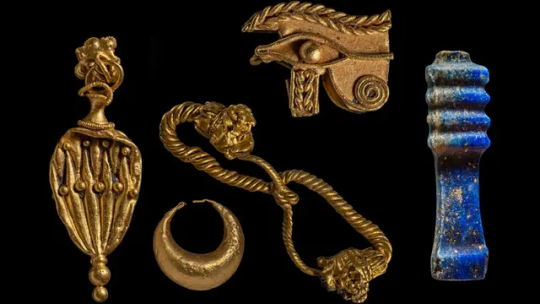
Sunken Temples of Aphrodite and Amun Found off Egyptian Coast
New discoveries off Egyptian coast reveal ‘treasures and secrets
New “treasures and secrets” have been revealed at the site of a sunken temple off Egypt’s Mediterranean coast, the European Institute for Underwater Archaeology (IEASM) announced in a news release Tuesday.
An underwater archaeological team, led by French marine archaeologist Franck Goddio, has made further discoveries at the site of a temple to god Amun in the ancient port city of Thonis-Heracleion in the Bay of Aboukir, the institute said.
The team investigated the city’s south canal, where huge blocks of stone from the ancient temple collapsed “during a cataclysmic event dated to the mid-second century BC,” the institute said.
The temple to god Amun was where pharaohs came “to receive the titles of their power as universal kings from the supreme god of the ancient Egyptian pantheon,” it said.
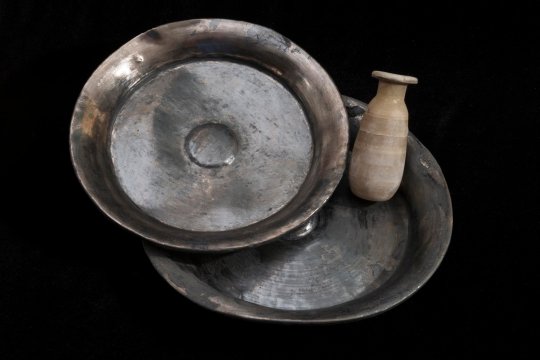
“Precious objects belonging to the temple treasury have been unearthed, such as silver ritual instruments, gold jewelry and fragile alabaster containers for perfumes or unguents,” IEASM said. “They bear witness to the wealth of this sanctuary and the piety of the former inhabitants of the port city.”
The archaeological excavations, conducted jointly by Goddio’s team and the Department of Underwater Archaeology of the Ministry of Tourism and Antiquities of Egypt, revealed underground structures “supported by very well-preserved wooden posts and beams dating from the 5th century BC,” the institute said.
“It is extremely moving to discover such delicate objects, which survived intact despite the violence and magnitude of the cataclysm,” said Goddio, who is president of IEASM and director of excavations.
The discoveries were made possible thanks to the development and use of new geophysical prospecting technologies that can detect cavities and objects “buried under layers of clay several meters thick,” the institute said.

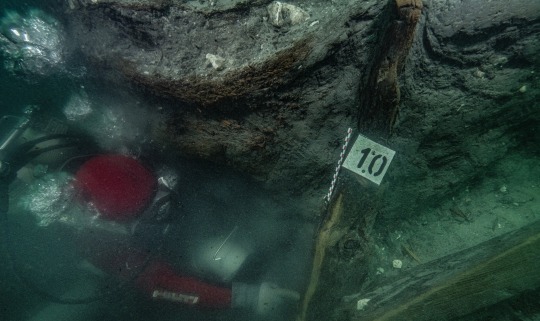
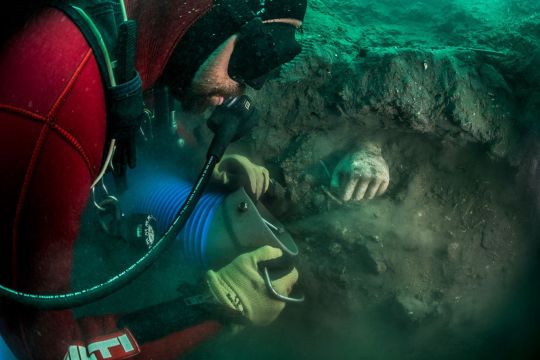
Relics from Greek presence, too
East of the Amun temple, a Greek sanctuary devoted to Aphrodite was discovered containing bronze and ceramic objects.
“This illustrates that Greeks who were allowed to trade and settle in the city during the time of the Pharaohs of the Saïte dynasty (664 - 525 BC) had their sanctuaries to their own gods,” the institute said.
The discoveries of Greek weapons also reveal the presence of Greek mercenaries in the area, IEASM said. “They were defending the access to the Kingdom at the mouth of the Canopic Branch of the Nile. This branch was the largest and the best navigable one in antiquity.”
The remains of Thonis-Heracleion are now located under the sea, 7 kilometers (4.3 miles) from the present coast of Egypt, IEASM said. The city was for centuries Egypt’s largest port on the Mediterranean before the founding of Alexandria by Alexander the Great in 331 BC.
“Rising sea levels and earthquakes followed by tidal waves triggering land liquefaction events, caused a 110 square kilometer portion of the Nile delta to totally disappear under the sea, taking with it the city of Thonis-Heracleion,” the institute said.
The city was discovered by the IEASM in 2000.
By Radina Gigova.
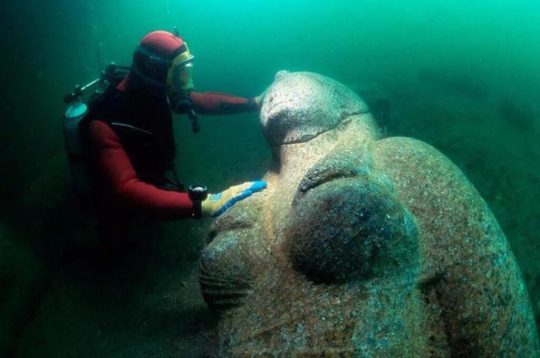
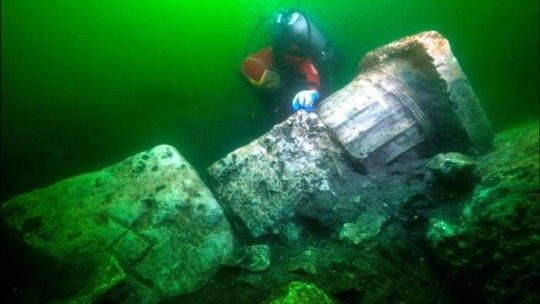
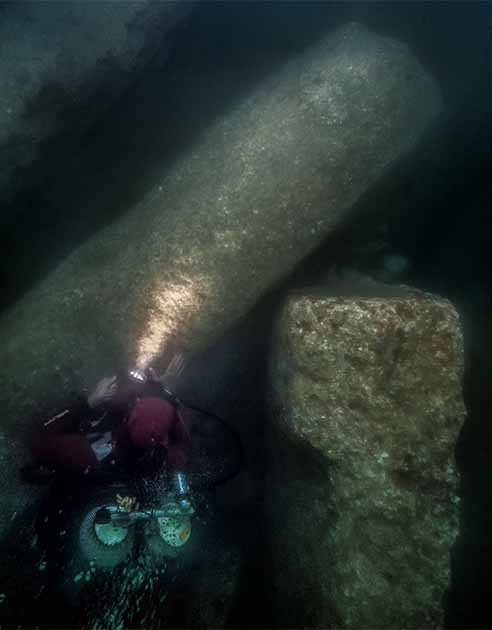
#Sunken Temples of Aphrodite and Amun Found off Egyptian Coast#Thonis-Heracleion#Bay of Aboukir#gold#gold treasure#ancient artifacts#archeology#archeolgst#history#history news#ancient history#ancient culture#ancient civilizations#ancient egypt#egyptian history#egyptian mythology#greek history
279 notes
·
View notes
Text
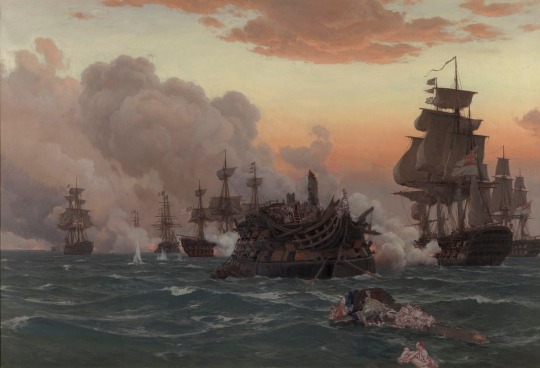
The Battle of the Nile, 1 August 1798
by Eduardo de Martino
#eduardo de martino#art#battle of the nile#horatio nelson#age of sail#mediterranean#egypt#france#england#aboukir bay#royal navy#great britain#britain#history#french revolutionary wars#ships#fleet#naval battle#naval battles#french#english#british#naval warfare#napoleonic#warship#warships
240 notes
·
View notes
Text
Napoleon in Egypt: *establishes a brilliantly politically savvy plan to use an invasion in Egypt to eventually sever the link between Britain and India, ultimately crippling the British economy and forcing them out of the war!*
Nelson: “Hold my wine, imma ruin this guy’s day”
*proceeds to obliterate the fleet, trapping 45k French soldiers in Egypt, establishing British naval dominance in the Mediterranean and turning several other European nations against France*
#musings#Nelson was just a few hours behind the French fleet for TWO MONTHS#Napoleon knew and ordered absolute secrecy for plans#Nelson spotted them in Aboukir bay and just immediately ordered an attack#it’s the victory that made Nelson a household name because his strategy was risky but in all truth genius
0 notes
Text
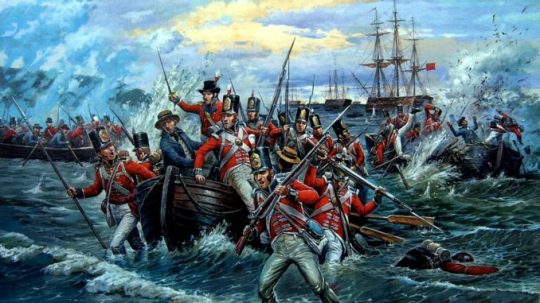
British Royal Marines disembarking from a task-force fleet in boats at Aboukir Bay 8th March 1801 – painted by Aleksandr Yezhov
55 notes
·
View notes
Photo
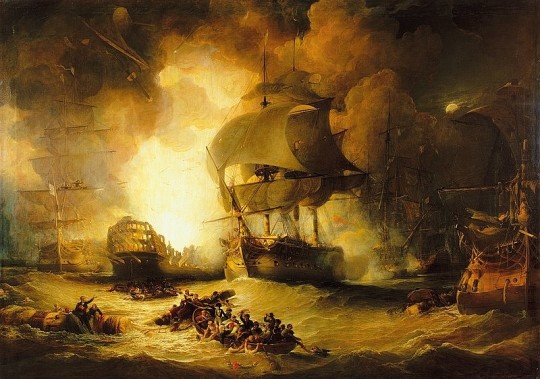
Battle of the Nile
The Battle of the Nile (1-2 August 1798), or the Battle of Aboukir Bay, saw a British fleet led by Rear-Admiral Sir Horatio Nelson (1758-1805) destroy a French fleet at Aboukir Bay near the Rosetta mouth of the Nile River. It was one of the most decisive naval battles of the French Revolutionary and Napoleonic Wars.
Continue reading...
39 notes
·
View notes
Text

Cleopatra - Queen of Egypt
Found underwater in Cleopatra Palace in Alexandria, Egypt
This 7.2ft-high granite statue is one of the greatest finds from Franck Goddio's ongoing exploration of the Bay of Aboukir, near Alexandria.
The statue shows the queen dressed as Isis, and wearing traditional royal robes associated with the goddess. Her hair in particular shows careful attention to detail, and she wears a diadem (crown) decorated with the uraeus snake, emblem of Egypt.
8 notes
·
View notes
Text

22nd February 1801 - Turkey. A force commanded by Sir Ralph Abercromby set sail from Marmorice Bay on the coast of modern-day Turkey. Their mission was the invasion of Egypt. Abercromby anchored off Aboukir Bay eight days later. The 18th Regiment, commanded by Lieutenant-Colonel Henry Montresor, were in the 2nd Brigade commanded by Major-General Cradock along with the 8th, 13th and 90th Regiments of Foot. Second in command of the army was John Hely-Hutchinson, a future Colonel of the 18th Foot.
#18thfoot #royalirishregiment #egypt
https://en.wikipedia.org/wiki/Henry_Montresor
1 note
·
View note
Text
New “treasures and secrets” have been revealed at the site of a sunken temple off Egypt’s Mediterranean coast, the European Institute for Underwater Archaeology (IEASM) announced in a news release Tuesday.
An underwater archaeological team, led by French marine archaeologist Franck Goddio, has made further discoveries at the site of a temple to god Amun in the ancient port city of Thonis-Heracleion in the Bay of Aboukir, the institute said.
The team investigated the city’s south canal, where huge blocks of stone from the ancient temple collapsed “during a cataclysmic event dated to the mid-second century BC,” the institute said.
The temple to god Amun was where pharaohs came “to receive the titles of their power as universal kings from the supreme god of the ancient Egyptian pantheon,” it said.
“Precious objects belonging to the temple treasury have been unearthed, such as silver ritual instruments, gold jewelry and fragile alabaster containers for perfumes or unguents,” IEASM said.
“They bear witness to the wealth of this sanctuary and the piety of the former inhabitants of the port city.”
The archaeological excavations, conducted jointly by Goddio’s team and the Department of Underwater Archaeology of the Ministry of Tourism and Antiquities of Egypt, revealed underground structures “supported by very well-preserved wooden posts and beams dating from the 5th century BC,” the institute said.
“It is extremely moving to discover such delicate objects, which survived intact despite the violence and magnitude of the cataclysm,” said Goddio, who is president of IEASM and director of excavations.
The discoveries were made possible thanks to the development and use of new geophysical prospecting technologies that can detect cavities and objects “buried under layers of clay several meters thick,” the institute said.
Relics from Greek presence, too
East of the Amun temple, a Greek sanctuary devoted to Aphrodite was discovered containing bronze and ceramic objects.
“This illustrates that Greeks who were allowed to trade and settle in the city during the time of the Pharaohs of the Saïte dynasty (664 - 525 BC) had their sanctuaries to their own gods,” the institute said.
The discoveries of Greek weapons also reveal the presence of Greek mercenaries in the area, IEASM said. “They were defending the access to the Kingdom at the mouth of the Canopic Branch of the Nile. This branch was the largest and the best navigable one in antiquity.”
The remains of Thonis-Heracleion are now located under the sea, 7 kilometers (4.3 miles) from the present coast of Egypt, IEASM said. The city was for centuries Egypt’s largest port on the Mediterranean before the founding of Alexandria by Alexander the Great in 331 BC.
“Rising sea levels and earthquakes followed by tidal waves triggering land liquefaction events, caused a 110 square kilometer portion of the Nile delta to totally disappear under the sea, taking with it the city of Thonis-Heracleion,” the institute said.
The city was discovered by the IEASM in 2000.
1 note
·
View note
Text
Events 8.1 (before 1900)
30 BC – Octavian (later known as Augustus) enters Alexandria, Egypt, bringing it under the control of the Roman Republic.
AD 69 – Batavian rebellion: The Batavians in Germania Inferior (Netherlands) revolt under the leadership of Gaius Julius Civilis.
527 – Justinian I becomes the sole ruler of the Byzantine Empire.
607 – Ono no Imoko is dispatched as envoy to the Sui court in China (Traditional Japanese date: July 3, 607).
902 – Taormina, the last Byzantine stronghold in Sicily, is captured by the Aghlabid army, concluding the Muslim conquest of Sicily.
1203 – Isaac II Angelos, restored Byzantine Emperor, declares his son Alexios IV Angelos co-emperor after pressure from the forces of the Fourth Crusade.
1291 – The Old Swiss Confederacy is formed with the signature of the Federal Charter.
1469 – Louis XI of France founds the chivalric order called the Order of Saint Michael in Amboise.
1498 – Christopher Columbus becomes the first European to visit what is now Venezuela.
1571 – The Ottoman conquest of Cyprus is concluded, by the surrender of Famagusta.
1620 – Speedwell leaves Delfshaven to bring pilgrims to America by way of England.
1664 – Ottoman forces are defeated in the battle of Saint Gotthard by an Austrian army led by Raimondo Montecuccoli, resulting in the Peace of Vasvár.
1714 – George, Elector of Hanover, becomes King George I of Great Britain, marking the beginning of the Georgian era of British history.
1759 – Seven Years' War: The Battle of Minden, an allied Anglo-German army victory over the French. In Britain this was one of a number of events that constituted the Annus Mirabilis of 1759 and is celebrated as Minden Day by certain British Army regiments.
1774 – British scientist Joseph Priestley discovers oxygen gas, corroborating the prior discovery of this element by German-Swedish chemist Carl Wilhelm Scheele.
1798 – French Revolutionary Wars: Battle of the Nile (Battle of Aboukir Bay): Battle begins when a British fleet engages the French Revolutionary Navy fleet in an unusual night action.
1800 – The Acts of Union 1800 are passed which merge the Kingdom of Great Britain and the Kingdom of Ireland into the United Kingdom of Great Britain and Ireland.
1801 – First Barbary War: The American schooner USS Enterprise captures the Tripolitan polacca Tripoli in a single-ship action off the coast of modern-day Libya.
1834 – Slavery is abolished in the British Empire as the Slavery Abolition Act 1833 comes into force, although it remains legal in the possessions of the East India Company until the passage of the Indian Slavery Act, 1843.
1834 – Construction begins on the Wilberforce Monument in Kingston Upon Hull.
1842 – The Lombard Street riot erupts in Philadelphia, Pennsylvania, United States.
1849 – Joven Daniel wrecks at the coast of Araucanía, Chile, leading to allegations that local Mapuche tribes murdered survivors and kidnapped Elisa Bravo.
1855 – The first ascent of Monte Rosa, the second highest summit in the Alps.
1863 – At the suggestion of Senator J. V. Snellman and the order of Emperor Alexander II, full rights were promised to the Finnish language by a language regulation in the Grand Duchy of Finland.
1876 – Colorado is admitted as the 38th U.S. state.
1893 – Henry Perky patents shredded wheat.
1894 – The Empire of Japan and Qing China declare war on each other after a week of fighting over Korea, formally inaugurating the First Sino-Japanese War.
0 notes
Text
Cossacks european wars mutiny in tolousse

Battle of Trafalgar 21 October – Horatio Nelson defeats Villeneuve, signals "England expects every man to do his duty", Nelson killed.Battle of Schöngrabern – Pyotr Bagration commands Russian and Austrian forces against Murat and Napoleon.Battle of Ulm 16–19 October – Napoleon forces surrender of Austrian army under Baron von Leiberich.Battle of Elchingen 14 October – French army, under Marshal Michel Ney, defeats an Austrian army.Ulm Campaign 25 September – 20 October – Napoleonic Wars.Battle of Ivankovac 18 August – Serbian rebels defeated Ottoman army during the First Serbian Uprising.Battle of Derne 27 April – 13 May – United States victory during First Barbary War.Siege of Bharatpur (1805) 2 January – 22 February.Battle of Tabkin Kwatto - First decisive battle of Fulani War.Battle of Vizagapatam - French defeat British in Bay of Bengal.Siege of Delhi - Brits and Mughals hold Delhi.Battle of Farrukhabad 17 November – Lake defeats Maratha forces of Jaswant Rao Holkar.Second Battle of Sitka 1–7 October – In reprisal for the 1802 attack, Russian forces defeat the Tlingit in the last major armed conflict between Europeans and Alaska Natives.Second Battle of Tripoli Harbor October 1803 – September 1804 – Indecisive battle between United States and Barbary Pirates.Battle of Echmiadzin (1804) June – Russian forces forced to withdraw by Iranian forces during Russo-Persian War.Battle of Suriname 5 May – Battle between the Netherlands and Great Britain for the control of the Suriname colony.Castle Hill convict rebellion 5 March – Irish convict uprising in the New South Wales colony.Battle of Ganja (1804) 22 November 1803 – 15 January 1804 – Battle between Russian Empire and Persian Empire for the control of Ganja citadel.Second Ottoman invasion of Mani - Ottomans fail to conquer Mani a second time.Battle of Argaon 28 November – Wellesley defeats Sindhia.Battle of Vertières 18 November – Haitians defeat French in last battle of war of independence.Battle of Laswari 1 November – Lake defeats Marathas near Agra.Battle of Assaye 23 September – English under Wellesley defeat Marathas under Daulat Scindia in Deccan.Battle of Delhi 11 September – British forces under Gerard Lake defeat Maratha forces led by French officer Louis Bourquin.Blockade of Saint-Domingue 18 June – 6 December.Battle of Poona - precursor to the Second Anglo-Maratha War.First Battle of Sitka 20 June – Tlingit warriors massacre Russians and Aleut workers, and carry off the women and children.Battle of Ravine-à-Couleuvres 23 February.Capitulation of Alexandria 30 August - End of the French campaign in Egypt and Syria.Battle of Mahé 19 August - British victory.Raids on Boulogne 4-16 August - French victory.Second Battle of Algeciras 12 July – British naval victory over French, Spanish.First Battle of Algeciras 6 July – British naval defeat by French.Action of 24 June 1801 - French victory.Battle of Copenhagen 2 April – Nelson defeats Danish fleet.Battle of Alexandria 21 March - British victory.Battle of Aboukir 8 March – British-Turkish army under Sir Ralph Abernathy defeats French Army of Egypt under Jacques de Menou.Action of 19 February 1801 - British victory.

0 notes
Text
ON THIS DATE !
The Battle of the Nile
Also known as the Battle of Aboukir Bay. It was a major naval battle fought between the British Royal Navy and the Navy of the French Republic on the Mediterranean coast off the Nile Delta of Egypt from the 1st to the 3rd of August 1798
0 notes
Photo

British line infantry land under fire at Aboukir Bay on 8 March 1801. By Aleksandr Yezhov
#aboukir bay#battle of aboukir bay#history#military history#british army#redcoat#redcoats#napoleonic#napoleonic wars#19th century
40 notes
·
View notes
Photo
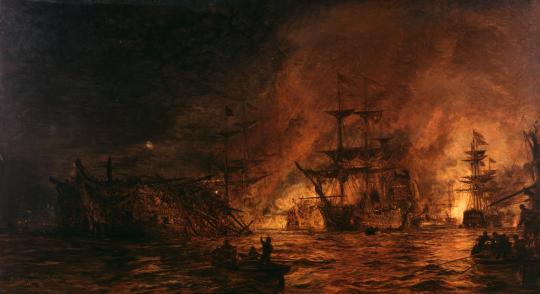
The Battle of the Nile by William Lionel Wyllie, 1899.
33 notes
·
View notes
Text
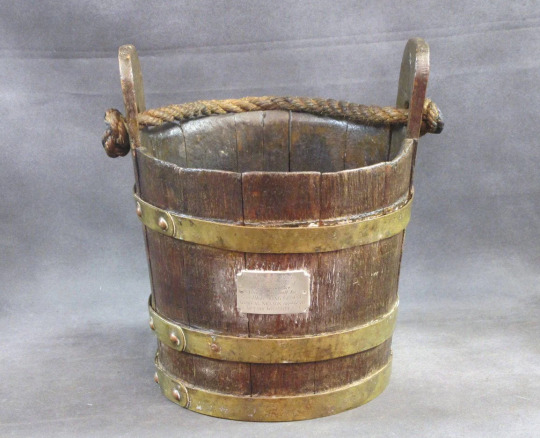
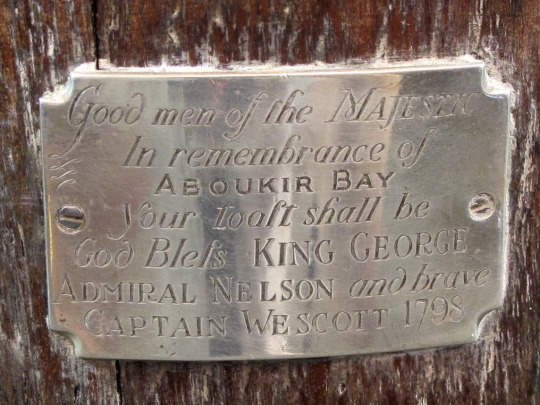
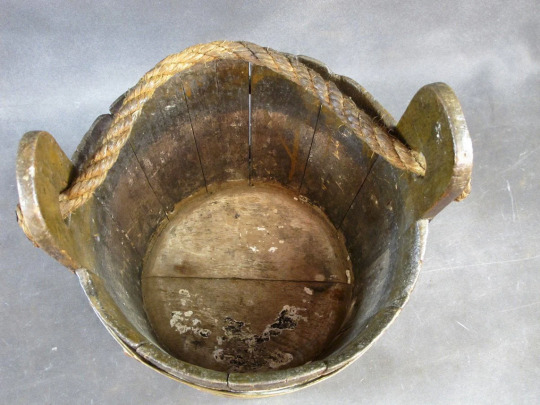
An original grog bucket from HMS Majesty, a 74 Gun third-rate ship of the line launched in 1785 at Deptford, England fought at Aboukir Bay, known as "The Battle of the Nile" under the command of Captain George Blagdon Westcott who was killed in during the action. Incribed : "Good men of the MAJESTIC. In remembrance of ABOUKIR BAY. Your toast shall be God Bless KING GEORGE, ADMIRAL NELSON and brave CAPTAIN WESTCOTT. 1798"
The contents of this bucket is of course not enough for the whole crew. But the grog was usually distributed from the barrel in such buckets to the individual divisions to avoid long queues.
62 notes
·
View notes
Text
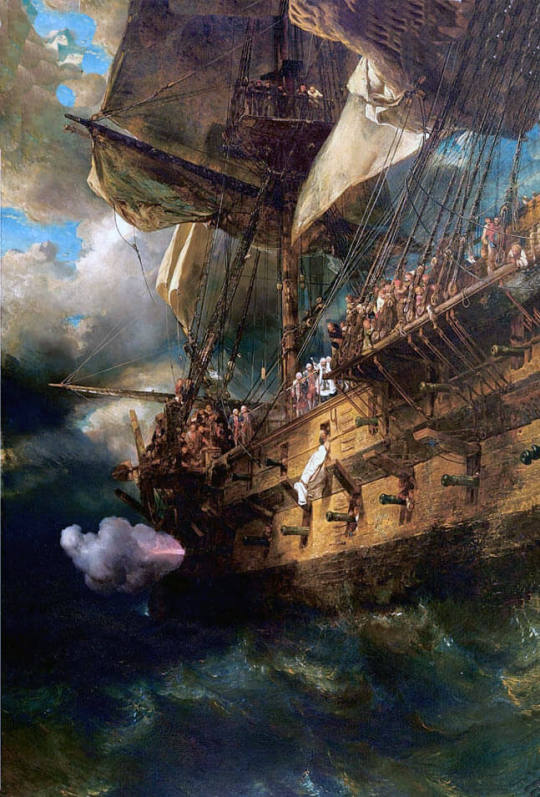
Burial of a naval officer at sea: Battle of the Nile on 1st August 1798 in the Napoleonic Wars: painting by Eugene Isabey.
#battle of the nile#battle of aboukir bay#napoleonic wars#horatio nelson#painting#history#marine painting#eugene isabey
54 notes
·
View notes
Text
Casabianca
Felicia Dorothea Hemans - her poem commemorates a real event, the explosion of the french ship L'Orient during the naval battle of Aboukir Bay, 1798.
The boy stood on the burning deck,
Whence all but he had fled;
The flame that lit the battle’s wreck,
Shone round him o’er the dead.
Yet beautiful and bright he stood,
As born to rule the storm;
A creature of heroic blood,
A proud, though childlike form.
The flames rolled on – he would not go,
Without his father’s word;
That father, faint in death below,
His voice no longer heard.
He called aloud – ‘Say, father, say
If yet my task is done?’
He knew not that the chieftain lay
Unconscious of his son.
‘Speak, father!’ once again he cried,
‘If I may yet be gone!’
– And but the booming shots replied,
And fast the flames rolled on.
Upon his brow he felt their breath
And in his waving hair;
And look’d from that lone post of death,
In still yet brave despair.
And shouted but once more aloud,
‘My father! must I stay?’
While o’er him fast, through sail and shroud,
The wreathing fires made way.
They wrapped the ship in splendour wild,
They caught the flag on high,
And streamed above the gallant child,
Like banners in the sky.
There came a burst of thunder sound –
The boy – oh! where was he?
Ask of the winds that far around
With fragments strewed the sea!
With mast, and helm, and pennon fair,
That well had borne their part,
But the noblest thing which perished there,
Was that young faithful heart.
#poetry#obedience#filial duty#l'orient#french navy#aboukir bay#battle of the nile#felicia dorothea hemans#naval warfare#napoleonic war#royal navy
1 note
·
View note